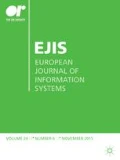Abstract
This paper offers guidance to conducting a rigorous literature review. We present this in the form of a five-stage process in which we use Grounded Theory as a method. We first probe the guidelines explicated by Webster and Watson, and then we show the added value of Grounded Theory for rigorously analyzing a carefully chosen set of studies; it assures solidly legitimized, in-depth analyses of empirical facts and related insights. This includes, the emergence of new themes, issues and opportunities; interrelationships and dependencies in or beyond a particular area; as well as inconsistencies. If carried out meticulously, reviewing a well-carved out piece of literature by following this guide is likely to lead to more integrated and fruitful theory emergence, something that would enrich many fields in the social sciences.


Similar content being viewed by others
References
Alavi M and Leidner DE (2001) Knowledge management and knowledge management systems: conceptual foundations and research issues. MIS Quarterly 25 (1), 107–136.
Baarspul HC and Wilderom CPM (2011) Do employees behave differently in public- versus private-sector organizations? A state-of-the-art review. Public Management Review 13 (7), 967–1002.
Buchanan DA and Bryman A (2011) The Sage Handbook of Organizational Research Methods. Sage Publications, London.
Cooper HM (1998) Synthesizing Research: A Guide for Literature Reviews. Sage, London.
Creswell JW (2008) Educational Research: Planning, Conducting, and Evaluating Quantitative and Qualitative Research. Prentice Hall, Pearson/Merrill.
Dubin R (1978) Theory Development. Free Press, New York.
Eisenhardt KM (1989) Building theories from case study research. Academy of Management Review 14 (4), 532–550.
Fernandez WD and Lehmann H (2011) Case studies and grounded theory method in information systems research: issues and use. Journal of Information Technology Case and Application Research 13 (1).
Furtmueller E, van Dick R and Wilderom C (2011) Service behaviour of highly committed financial consultants. Journal of Service Management 22 (3), 317–343.
Glaser B and Strauss A (1967) The Discovery of Grounded Theory: Strategies for Qualitative Research. Aldine, Chicago.
Glynn A and Raffaelli R (2010) Uncovering mechanisms of theory development in an academic field: lessons from leadership research. The Academy of Management Annals 4 (1), 359–401.
Hart C (1998) Doing a Literature Review: Releasing the Social Science Research Imagination. Sage, London.
Hart C (2000) Doing a Literature Search: A Comprehensive Guide for the Social Sciences. Sage, London.
Humphrey SE (2011) What does a great meta-analysis look like? Organizational Psychology Review 1 (2), 99–103.
Kaplan A (1964) The Conduct of Inquiry. Harper & Row, New York.
Merton RK (1967) On Theoretical Sociology. Free Press, New York.
Salipante P, Notz W and Bigelow J (1982) A matrix approach to literature reviews. Research in Organizational Behavior 4, 321–348.
Schwartz RB and Russo MC (2004) How to quickly find articles in the top IS journals. Communications of the ACM 47 (2), 98–101.
Suddaby R (2006) From the editors: what grounded theory is not. Academy of Management Journal 49 (4), 633–642.
Sutton RI and Staw M (1995) What theory is not. Administrative Science Quarterly 40 (3), 371–384.
Strauss A and Corbin J (1990) Basics of Qualitative Research: Grounded Theory Procedures and Techniques. Sage, London.
Strauss A and Corbin J (1998) Basics of Qualitative Research: Techniques and Procedures for Developing Grounded Theory. Sage, London.
Urquhart C and Fernandez W (2006) Grounded theory method: the researcher as blank slate and other myths. Twenty-Seventh International Conference on Information Systems, Milwaukee, United States of America.
Webster J and Watson RT (2002) Analyzing the past to prepare for the future: writing a literature review. MIS Quarterly 26 (2), 13–23.
Whetten DA (1989) What constitutes a theoretical contribution? Academy of Management Review 14 (4), 490–495.
Wolfswinkel JF, Furtmueller E and Wilderom CPM (2010) Reflecting on e-recruiting research using grounded theory. Proceedings of the European Conference on Information Systems, Pretoria, South Africa.
Author information
Authors and Affiliations
Corresponding author
Rights and permissions
About this article
Cite this article
Wolfswinkel, J., Furtmueller, E. & Wilderom, C. Using grounded theory as a method for rigorously reviewing literature. Eur J Inf Syst 22, 45–55 (2013). https://doi.org/10.1057/ejis.2011.51
Received:
Revised:
Accepted:
Published:
Issue Date:
DOI: https://doi.org/10.1057/ejis.2011.51



